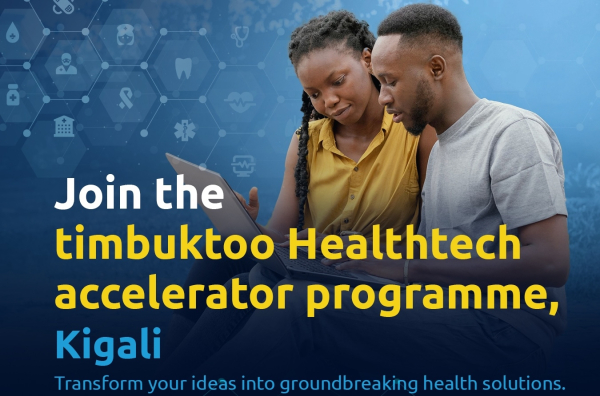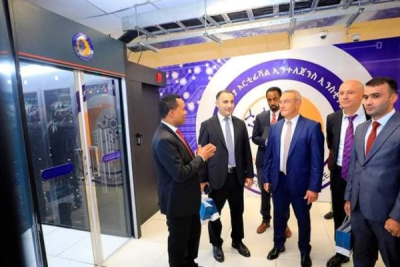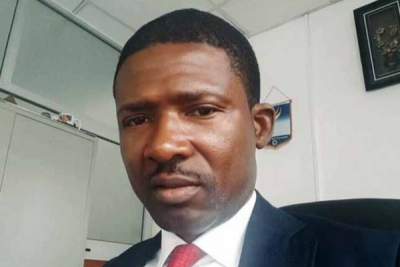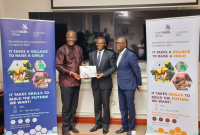The United Nations Development Program (UNDP) and Timbuktoo Africa Innovation Foundation have launched the HealthTech Startup Accelerator Program, a Pan-African initiative focused on transforming healthcare across the continent. Hosted at the HealthTech Hub in Kigali, Rwanda, the program aims to empower startups to develop innovative health technologies that address Africa's critical healthcare challenges.
The accelerator offers early-stage startups mentorship, funding, and access to advanced resources. Applications are open to African-owned startups with founders aged 18 to 35, who have a minimum viable product in sectors like telemedicine, healthcare logistics, diagnostics, and mobile health. Interested startups must apply by October 6, 2024.
He is passionate about improving education for South African students. With the startup he leads, he is committed to helping students become more independent learners, taking charge of their own education.
South African entrepreneur Kagisho Masae (photo) is the co-founder and CEO of Matric Live, an edtech startup focused on enhancing learning experiences for students. Founded in 2017 by Masae and Lesego Finger, Matric Live offers a multifunctional educational app that revolutionizes how students learn, making the process more contextual and visual. The app covers over 16 subjects, helping students prepare for their exams.
One of the app's key features is Live Exams, a simulated exam function that allows students to answer past exam questions directly on their device. It tracks the questions where students frequently give incorrect answers, enabling them to focus on and thoroughly analyze these areas.
According to the startup's website, "The platform has expanded to cover most of the high school curriculum, and the team continues to grow steadily. The aim through this platform, among other initiatives that are in the pipeline from the holding company, is to decentralize quality education."
In addition to his work with Matric Live, Masae is the founder of CynC, a digital platform connecting like-minded individuals across South Africa. He also serves as an ambassador for the charity organization One Young World and a project coordinator for the nonprofit Good Deeds Foundation.
Masae holds a certificate in financial products from Milpark Business School, earned in 2012. In 2019, he received a certificate in behavioral economics from the University of Toronto, and in 2021, he obtained a certificate in strategy execution from Harvard Business School Online.
Masae began his professional career in 2010 at Discovery Ltd, a South African financial services group, where he worked as a broker relations manager. In 2015, he joined the financial company Investec as a consultant, later holding positions as marketing and brand project manager for the wealth and investment sector.
Melchior Koba
As a super apps, MoyaApp offers a range of services, including payment processing, instant messaging, and entertainment options.
MoyaApp is a digital solution developed by the South African company Datafree Africa. Launched in 2019 by Gour Lentell, it allows users to access a variety of services through its mobile application. The super app is available on both iOS and Android platforms, where it has been downloaded over 10 million times, according to Play Store data. After downloading, users create an account to access the various services offered by the app. These services include chatting with friends, accessing live football scores, staying updated with the latest news, and making online payments.
One of the key features of MoyaApp is that users do not need mobile data to send text and voice messages. However, sending attachments requires mobile data. The startup explains this by stating that attachments require much more data than text messages, and if all media messages were free, MoyaApp would not have the capacity to keep the lights on.
Regarding other features of the super app, the startup has partnered with various companies. For instance, it has teamed up with Flash Score to provide live football scores. Access to these third-party applications requires “Prepaid Access,” which means paying for the content via MoyaApp.
"Prepaid access means that you as the user will pay for the content you want to see for how long you would like to see it. The prepaid content apps are datafree, therefore you do not need data to open Flash Score or apps that are prepaid as you only pay for the content you want to see," explains the startup.
Adoni Conrad Quenum
Artificial intelligence is becoming increasingly important in global technological advancements, including in Africa. International partnerships are being explored to foster AI growth on the continent and maximize its potential benefits.
Azerbaijan is looking to bolster its cooperation with Ethiopia in the field of artificial intelligence (AI). A high-level Azerbaijani government delegation, led by Mohammad Ali Kudaverdev, visited the Ethiopian Artificial Intelligence Institute on Wednesday, August 28, to explore potential collaborations.
The visit, reported by the Ethiopian News Agency (ENA), is part of ongoing efforts by both countries to identify areas for AI expertise exchange. It follows a similar visit by Russian officials on August 21, underscoring Ethiopia's growing interest in AI.
Ethiopia has recently accelerated its AI initiatives, focusing on sectors like healthcare and agriculture. The country passed legislation in 2023 to regulate AI and established the Ethiopian Artificial Intelligence Institute three years ago. Azerbaijan is also developing its national AI strategy.
The collaboration aims to foster knowledge sharing, develop innovative AI solutions, and capitalize on the economic opportunities offered by AI. According to PwC's "Annual Global CEO Survey," AI could contribute up to $15.7 trillion to the global economy by 2030, including $1.2 trillion in Africa, representing a 5.6% increase in the continent's GDP.
Samira Njoya
AfriLabs invites Nigerian tech innovators and entrepreneurs to an exclusive, self-funded trip to Paris from October 9th to 11th, 2024. This trip offers a chance to secure investment, gain industry insights through 500+ workshops and conferences, and participate in 33,500 business meetings.
It is also a platform to showcase Nigerian innovations on a global stage. The program is open to hubs, entrepreneurs, and key players in Nigeria's tech ecosystem.
Registration closes by September 7.
He is an expert in economics and management, passionate about using technology to solve societal problems. Through his company, Ylomi, he is formalizing the home services sector.
Jean Vivien Dah N'Gbekounou, a Beninese entrepreneur, is the founder and CEO of Ylomi, a digital startup that connects households and businesses with skilled domestic workers. Established in 2018, Ylomi offers a web and mobile application that helps meet the labor needs of households and small to medium-sized enterprises (SMEs). The platform provides access to a wide range of domestic workers, including housekeepers, maintenance workers, caregivers, cooks, security guards, nannies, bartenders, cashiers, and construction workers.
"In Africa, and particularly in Benin, artisans are often overlooked in the digital ecosystem. It's difficult for the average person to easily and quickly connect with a skilled worker for urgent services and tasks. This problem is persistent, which inspired us to create Ylomi to provide a lasting solution," explained Jean Vivien Dah N'Gbekounou in 2018.
Ylomi also manages existing employees, thereby reducing risks for households. In addition, the platform connects clients with service providers for occasional needs, such as plumbers, electricians, or TV repair technicians. To ensure the quality and security of services, Ylomi trains or retrains workers, verifies their identities, and ensures their moral integrity. The company's services are backed by liability insurance.
In addition to his role at Ylomi, Jean Vivien Dah N'Gbekounou has been the director of Africa Consult since 2011, a firm authorized by the Financial Markets Authority of the West African Economic and Monetary Union (AMF-UEMOA). Previously, he worked as the administrative and financial manager at the Société Internationale de Transit Toure (SITT SA) in Benin from 2004 to 2008.
N'Gbekounou holds a master's degree in Stock Markets and Trading from the French School of Stock Exchange and Trading, earned in 2013, and a postgraduate diploma (DESS) in Finance and Management Control from the Graduate School of the Faculty of Economics and Management at the University of Abomey-Calavi, Benin.
Melchior Koba
The Zambia Chamber of Mines has urged the government to incorporate Artificial Intelligence (AI) and modern technology into the Technical Education, Vocational, and Entrepreneurship Training (TEVET) curriculum.
At an August 25 meeting with Technology Minister Felix Mutati, Zambia Chamber of Mines Vice President Charles Sakanya emphasized the need to equip artisans with AI skills essential for exploration and mineral mapping.
Minister Mutati confirmed that the TEVET Act is being revised to focus on competency-based training and called on the mining sector to contribute to this update.
Konga, a leading Nigerian online marketplace, has announced a strategic partnership with Starlink to provide satellite internet services to underserved areas across the country. This collaboration is aimed at bridging the digital divide by delivering reliable, high-speed internet connectivity to regions with limited or no terrestrial internet coverage.
As the only authorized shop-in-shop for Starlink in Nigeria, Konga is enthusiastic about the potential impact of this partnership. Through their partnership, Konga and Starlink are playing a pivotal role in ensuring that all Nigerians can benefit from the transformative power of the internet.
With over a decade of experience in technology, product development, and strategy, he is passionate about artificial intelligence. He has created a conversational AI platform tailored for businesses and content creators.
Timothy K. Afrane Wuo-Asare (photo) is a Ghanaian computer scientist and the co-founder and CEO of Copianto AI, a startup focused on artificial intelligence that provides tools for content creation. Founded in 2022 by Afrane Wuo-Asare, along with Daniella Darlington, Alex Boateng, and Alfred Sosu, Copianto AI is part of the MEST Africa portfolio. The company offers an adaptable conversational AI platform designed for various users, including writers, marketers, entrepreneurs, and agencies, to simplify content creation and optimization.
The conversational AI platform developed by Copianto enables businesses to create personalized AI agents that can be integrated across their platforms. These agents assist customers by providing answers, solving problems, and facilitating actions. Additionally, the startup has introduced a voice AI agent that enhances communication dynamics within companies, offering instant and practical assistance during voice calls.
Afrane Wuo-Asare graduated from Kwame Nkrumah University of Science and Technology, earning a Bachelor’s degree in Computer Science in 2017. His professional journey began in 2013 with an internship in development at Kudobuzz, a company that creates tools for online merchants.
From 2015 to 2016, he served as a community manager for Startup Weekend in Accra, a 54-hour event focused on forming teams to build viable businesses over a weekend. In 2018, he became an IT project manager at Ghana's Regional Maritime University. He later joined Molaprise, a consulting firm and technology solutions provider, as a systems engineer, while also working as a product manager at Survey54, a company offering business intelligence services.
Melchior Koba
The solution aims to simplify administrative procedures for the Congolese population.
Mokanda is a digital solution developed by the Congolese company Afrique Digital, to streamline civil status procedures for residents of the Democratic Republic of Congo. Launched in April 2024, the platform aims to make accessing essential documents easier for Congolese citizens.
Currently, Mokanda is a web-based platform with no mobile app. Users can create an account by visiting the website and providing the necessary information. Once registered, they can access various civil status services, including birth certificates, certificates of good conduct, residence certificates, and family composition certificates.
It also allows users to track the progress of their applications remotely and make payments using bank cards or mobile money. After completing the application process, users can collect their documents from the local municipal office or opt for home delivery. A fee is charged for home delivery.
Adoni Conrad Quenum
More...
The global telecom sector is currently exploring various initiatives aimed at ensuring the profitability of investments while protecting the environment. However, achieving this balance requires several prerequisites, including recycling plants.
French telecom group Orange recently announced that it collected 479,853 units of mobile phone waste in 2023 across the Middle East and Africa, representing 24% of the devices sold in the region. This initiative is part of the company’s broader strategy to promote a circular economy tailored to the specific needs of each market.
By 2025, Orange aims to increase the use of refurbished equipment in its networks and data centers, supported by its OSCAR program. This program encourages the reuse of devices to reduce carbon emissions and promote sustainable electronic waste management. The company expects this approach to positively impact its equipment expenses.
Since 2010, it has partnered with Emmaüs International and Ateliers du Bocage to establish mobile waste collection workshops in Africa. In 2023, these workshops in Burkina Faso, Cameroon, and Côte d'Ivoire recovered the equivalent of 264,000 mobile devices for recycling.
Last year, the company expanded its recycling efforts in Egypt by partnering with the United Nations Industrial Development Organization (UNIDO) to open a state-of-the-art facility for refurbishing electronic devices. This project supports Orange’s goal of reducing its environmental impact, promotes local job creation, and develops specialized skills.
Additionally, the facility will help promote digital inclusion by offering refurbished phones at more affordable prices to low-income populations. According to a market analysis by Custom Market Insights, the market for refurbished and used mobile phones in the Middle East and Africa was valued at $5.33 billion in 2021 and is expected to reach nearly $12.39 billion by 2030, driven by growing demand for mobile internet.
Muriel EDJO
Ghanaian fintech startup PayBox has launched a mobile application that leverages blockchain technology and artificial intelligence (AI) to reduce transaction fees and simplify cross-border payments.
The application, Buddy, offers streamlined financial solutions for small and medium-sized enterprises (SMEs) across more than 23 African countries.
By functioning as both a mobile and decentralized app, Buddy offers a user-friendly interface, empowering users to manage their personal and business finances with ease.
MEST Africa is inviting emerging tech entrepreneurs to participate in the MEST Africa Challenge (MAC) 2024. As Africa’s premier pitch competition, MAC 2024 will focus on agri-tech startups in West Africa.
The winning startup will receive investment capital, coaching, and access to a global network of resources. Applications open on August 26, 2024, and close on October 4, 2024, with virtual semifinals scheduled for October 29-30, 2024.
Eligible startups must have a minimum monthly revenue of $5,000, raised less than $1 million in funding, and have been operating for three years or less. All participants will pitch in English.
A software engineer, he leverages technology to support the agricultural sector in Ethiopia. His work includes assisting beekeepers by providing them with the essential information they need to make informed decisions.
Abiye Tadeos (photo) is an Ethiopian entrepreneur and embedded systems engineer, known for his innovative work in the agricultural sector. He is the founder and CEO of Anabi Agritech Solutions, a company dedicated to integrating IoT (Internet of Things) solutions for beekeeping in Africa and globally.
Founded in 2020, Anabi Agritech Solutions is a tech-driven agricultural company specializing in apiculture. The company utilizes sensors installed inside beehives to collect and analyze data, making decision-making easier for beekeepers. The collected data includes temperature, humidity, weight, and sounds, all of which are transmitted directly to the beekeepers' mobile devices.
"Our sensor units send hive information to any mobile device creating a transparent monitoring system between small beekeepers and their contractors, simultaneously alerting and notifying hive operators to guarantee zero loss in production," the startup’s founder explained in 2021.
Anabi Agritech Solutions also connects monofloral honey beekeepers to the global market through its online platform, helping them expand their customer base and boost sales.
Abiye Tadeos holds a bachelor's degree in computer engineering, which he earned in 2017 from the Addis Ababa Science and Technology University. After his studies, he interned at iCog Labs, a company specializing in artificial intelligence, before becoming a junior software developer there in 2018. He left the company in 2019 to focus on developing his startup.
Melchior Koba















